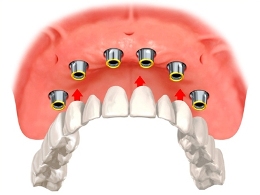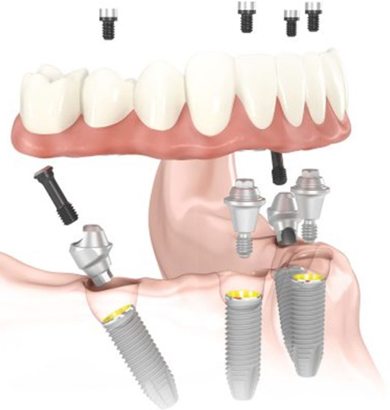I am wearing dentures and having trouble with the upper dentures. The hardness of the denture plate is making me gag quite a bit. The lower dentures seem fine and don’t bother me at all. Is there a chance there is something like a soft denture, at least for the upper arch?
Ainsley
Dear Ainsley,
There are dentures with soft linings, but not a soft denture. These are mostly useful for the bottom denture though. They help people who are having pain with the lower denture, which rests on a lower ridge bone. Sometimes a patient will have a bony ridge, which can be an irritation. The soft liner makes that a bit easier and can help prevent sores.
The upper dentures needs a hard plate because it depends on that framework in order to help you with chewing. Even though there isn’t a a soft denture, there is a solution for your problem. My suggestion is that you upgrade to implant supported dentures. Though this is normally more important for your lower dentures, which I’ll explain momentarily, it will simultaneously solve your upper denture problem as well.
Your lower dentures are held in by resting on the ridge of your jawbone. Unfortunately, once your teeth were removed, your body immediately started to resorb the minerals in that jawbone to use elsewhere in your body now that there were no teeth to support. After about ten years or so, you will no longer have enough of a jawbone left to retain your dentures in place. In dental circles, this is known as facial collapse.
By placing dental implants in your bone, it signals to your body that you still have teeth and you will need those minerals to help you retain your teeth. Because of that, it will leave your jawbone intact. Then, you can anchor a denture to the implants. Not only will you no longer have to worry about facial collapse, but if you do it on your upper denture as well then you will have no plate there, which means no gagging. As a bonus, you will find your quality of life, including your chewing capacity, greatly improved.
This blog is brought to you by Hoffman Estates Dentist Dr. William Becker.
Click here to learn about dental implants versus a dental bridge.

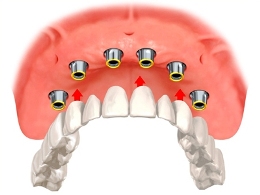
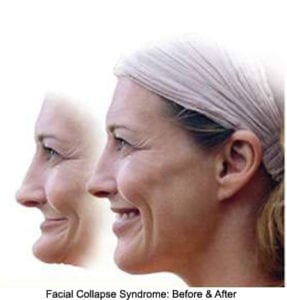 For those who may be unfamiliar with this term I want to go over what happens when your teeth are removed. Our bodies are designed to be remarkably efficient. When your teeth are removed, your body recognizes there are no longer tooth roots and will begin to resorb the minerals in your jawbone that were helping to retain your teeth. It does this in order to use its resources in the best way it can. While a fantastic way of distributing resources, it has the unfortunate effect of slowly shrinking your jawbone. After ten years or so, you will no longer have enough of a jawbone to even retain your dentures in your mouth, effectively making you a dental cripple.
For those who may be unfamiliar with this term I want to go over what happens when your teeth are removed. Our bodies are designed to be remarkably efficient. When your teeth are removed, your body recognizes there are no longer tooth roots and will begin to resorb the minerals in your jawbone that were helping to retain your teeth. It does this in order to use its resources in the best way it can. While a fantastic way of distributing resources, it has the unfortunate effect of slowly shrinking your jawbone. After ten years or so, you will no longer have enough of a jawbone to even retain your dentures in your mouth, effectively making you a dental cripple.
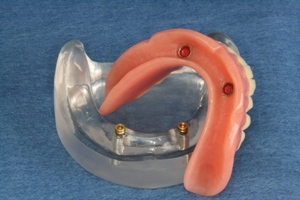
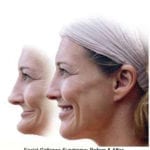 When your teeth were first removed, your body began to resorb the minerals in your jawbone to use elsewhere in your body where they will be more useful. Unfortunately, this has the unfortunate side-effect of slowly shrinking your jawbone. After ten years, it starts to get harder to properly fix your dentures. In twenty to thirty years you won’t have enough jawbone left to keep your dentures in. This is known as facial collapse.
When your teeth were first removed, your body began to resorb the minerals in your jawbone to use elsewhere in your body where they will be more useful. Unfortunately, this has the unfortunate side-effect of slowly shrinking your jawbone. After ten years, it starts to get harder to properly fix your dentures. In twenty to thirty years you won’t have enough jawbone left to keep your dentures in. This is known as facial collapse.